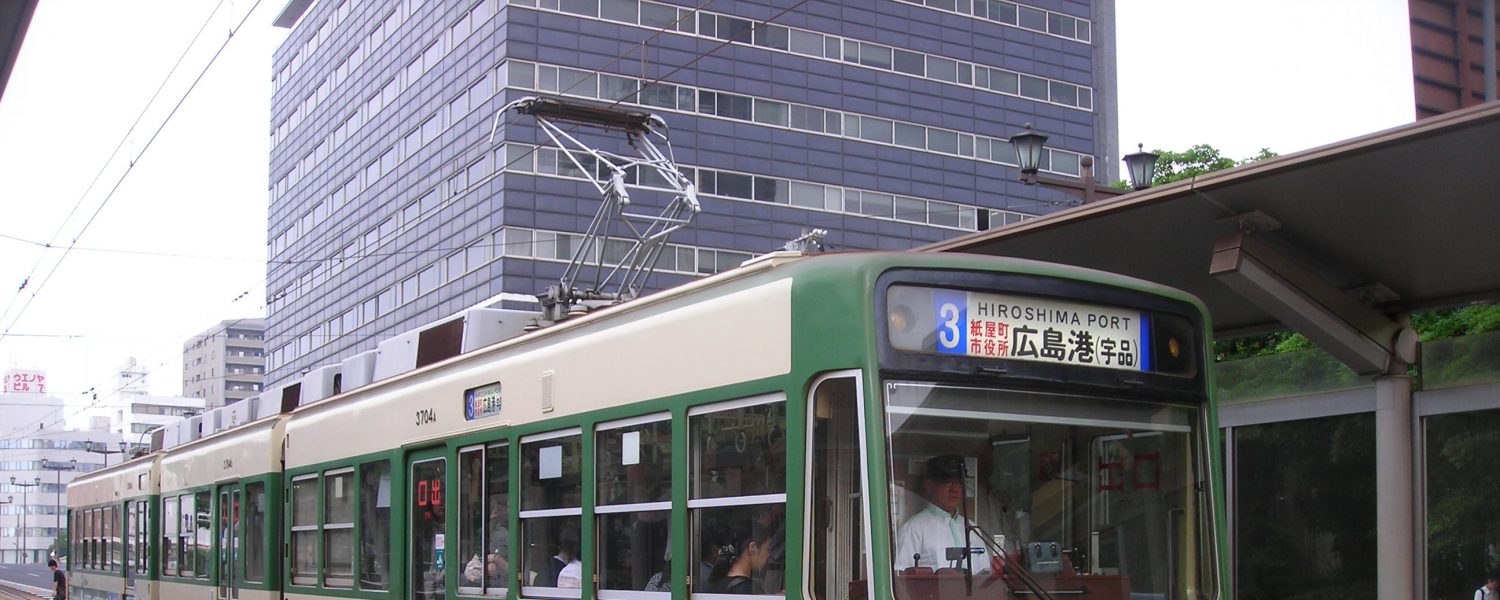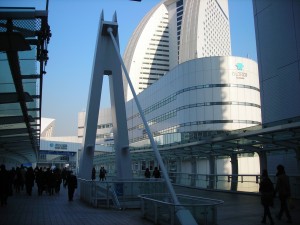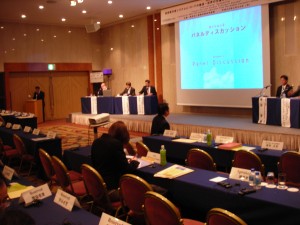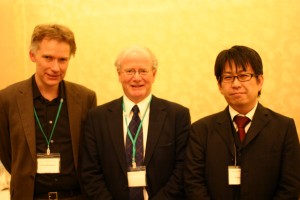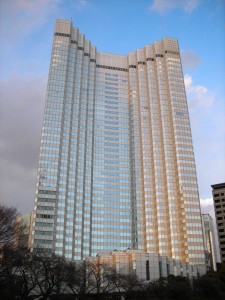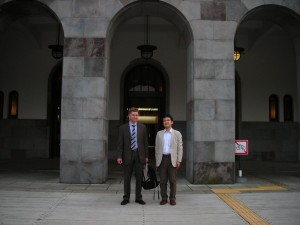NEWS FROM HENRIKS RESEARCH EXCHANGE VISIT TO TOKYO JANUARY – JULY 2011
—————————————————————————————————————————–
April 8, 2011. Work and school proceeding for us all. No harm to Tokyo or us from the major 7.4 (Magnitude) afterchock April 7.
—————————————————————————————————————————–
March 28, 2o11. We are back in Tokyo after vacation. The situation has improved and we consider it safe for the time being.
—————————————————————————————————————————–
March 18, 2011: My family and I are safe and sound in Tokyo so far after the Tohoku Earthquake.
We leave Tokyo today for a vacation in the Okinawa islands returning on March 27.
We hope Tokyo and Japan will recover quickly and suffer no further damages. Our thoughts are with the victims of the tsunami and other terrible occurrances. You may wish to join us in donating at: http://www.japansociety.org/earthquake.
—————————————————————————————————————————–
March 1st, 2011: Presenting sustainable transport indicators at United Nations University (UNU), Yokohama
I was kindly invited to give a talk about indicators at the Institute of advanced Studies of the UNU. I called it ‘Indicators of sustainable transport – why, what and how to measure? Results of the European ‘COST’ Action 356’, The talk presesented results of the four-year COST 356 research network which set out to define methods for selecting and apply environmental sustainability indicators.
It was particularly relevant to discuss with the audience from UNU and other Japan based organisations to what extent the notion of environment differs between Europe and East Asia, and if the criteria for electing indicators coud be similar. It seems that finding data is likely to be an even bigger challenge than in Europe than in soms of the latter group of countries.
Link to the COST 356 report and other materials: http://cost356.inrets.fr/
Site of the presentation, the UNU-IAS. in MinatoMirai, Yokohama
—————————————————————————————————————————–
February 24, 2011: Vision for a Low carbon Transport system: We can reduce CO2 by 50%
An international symposion was held in the context of the international ‘Study of Transport System in a Low Carbon Society’ (STL) project, at The Grand Prince Hotel, Akasaka, Tokyo, on February 24th.
It was a prestigeous event, with several hundred participants and with keynotes by Dr Rajendra Pachauri, Chairman of the Nobel Prize winning IPCC, and Professor David Banister, of Oxford University. The key findings were discussed by an international panel of experts. The Institution for Transport Policy Studies (ITPS) of Japan organized the symposion and has played a key role in the project.
Panel: Banister, Crist, Dalkmann, Inada
With Banister, Matsuoka
The project illustrates the massive challenges associated with a transition to a low carbon transport system on a global scale, but it also that demonstrate a large number of feasible actions worldwide. The study has produced a series of scenarios for different regions of the world, Europe, North America, Latin America, China, India, and Souhteast Asia. Business as usual projections as well as scenarios assuming different policy packakes, combining elements from the socalled ‘Avoid’. ‘Shift’, and ‘Improve’ strategies.
Business as usual scenario shows that Global transport emission could well rise to the double amount of 2010 by 2050.
A common global policy scenario aimed to instead reduce emissions to 50% of today by 2050 on a per capita basis. According to the study this scenario is possible, by using different combinations of measures in each region of the world. It is interesting that the regional scenarios assumes differents strategies, taking into account regional varioation, in economy, technology, and governance. According to Dr Tanaka of IPTS, Japan, technological changes (‘improve’ strategies) will not be sufficient alone on a global scale. According to Lee Schipper of UC Berkeley, US the target will likely be most difficult to reach in North America where a high level of individual mobility is the norm, and measures of the types ‘avoid’ and ‘shift’ are not popular. Each
In the panel debate Dr. Pachauri noted the strong ‘monoculture’ in the transport sector, where transport is not being considered in an integrated way, across modes, as it should. Dr. Dalkmann made the point that elected politicians have the tendency to focus only on the short run.
It was agreed that there is an urgent need for action, considering the scale of the need for change. One major barrier is that CO2 reduction does not appear to work as a sufficiently strong political driver for the required transitions of the transport system. Climate change must be considered together with other cost and benefits of transport to allow neceassary change to occur.
More information and slides on http://www.jterc.or.jp/english/kokusai/conferences/110224_event.html
Site of the Symposium – Grand Prince Asakasa. Soon to be demolished? Not if protests from the Japan Institute of Architects, and the International Union of Architects are taken into account. The lament the tendency of developers and governments to neglect Modern Achitecture even allowing recent major works like this one by famed Kenzo Tange to be torn down. So far no date for the said demolition has been published.
—————————————————————————————————————————–
February 1st 2011
In early January my family and I arrived safely from Denmark for our six months stay in Japan, where I am a guest researcher at Tokyo Kokyu Daigaku (TOKODAI, the Tokyo Institute of Technology). It is great to be here! We have all quickly settled in at work, school, accomodation, etc. thanks to outstanding hospitality and help from my host Dr Daisuke Fukuda and his staff at TOKODAI, my sponsor the Japan Society for the Promotion of Science (JSPS) , and all Japanese authorities we have encountered.
This image (from an earlier visit) shows Fukuda-Sensei (at right) and me in front of TOKODAI main building.
My topics as guest researcher are sustainability, climate change and performance measurement in transport policy, looking at Japan in comparison with other regions of the world.
At this initial stage the research plans are still under development and the first contacts to Japanese scholars have been made.
I have also had leave to participate with two papers at the TRB international transportation Research conference in Washington DC, January 23-27 where I made further contacts with Japanese and US colleagues.
I have now kindly been invited to speak at the United Nations University – Institute of Advanced Studies in Yokohama on March 1st (http://www.ias.unu.edu/). You are welcome to attend.
More news and impressions from my stay and work will be posted at this site at varying intervals. Research results will presented through regular academic channels.
